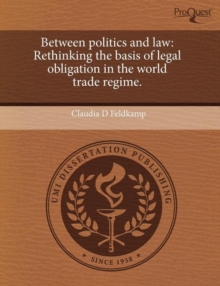The basic claim of this thesis is that effective law in the international sphere (particularly in the WTO), as at the national level, must have a rich political base.
This political base is created and maintained by ongoing political 'conversation' which can be encouraged or undermined by institutional design.
In this thesis, I describe and analyze two contrasting narratives describing the institutional development of GATT/WTO and the dynamic between legal and political processes.
The first, and most common narrative of the development or history of GATT/WTO, is the legalization account which describes the story of GATT/WTO as one of progressive, even inevitable, legalization.
Conversely, the second narrative insists on the necessary interaction or dynamic of political and legal process in the development of a rule-based or rule-oriented regime for the WTO.
The two narratives place different emphasis on the power of laws and institutional design in a multilateral forum to bring about change in the nature of the relationships between member states of vastly different political and economic power.
I argue that while a multilateral, rule-based system will not eradicate the impact of political and economic differentials, incrementally and often subtly, such a forum can change the nature of the conversation while providing the institutional tools which enable weaker states to engage more effectively.
The dissertation consists of three articles. The first, entitled Countermeasures: A Remedy Worse than the Illness?, considers the role of institutional design, specifically remedies, in promoting or enhancing political dialogue around issues of trade and trade-related issues.
I argue that remedies can help preserve and enhance the perceived legitimacy, security and predictability of rules and further broader communal goals, reflected in the rules and mandate of a legal system.
Countermeasures are critiqued as structurally incompatible with the WTO and as politically problematic; countermeasures create political dynamics, both domestic and international, which undermine the positive value of multilateralism in trade.
The second paper is entitled Weak Remedies: A Key to Institutional Health in the WTO?.
In this paper, I consider the broader question of the nature of legal obligation in the WTO.
I do this by examining a debate as to whether strict compliance with WTO rules and decisions is required or whether persistent use of remedies, such as countermeasures, is an acceptable alternative.
I argue that compliance is best characterized as obligatory, not only because it is the rule, but because members gain something in surrendering to WTO disciplines, namely political voice, and risk compromising this critical political voice when they fail to comply.
In the third paper, Enhancing Legitimacy: The Act of Legal Compliance as a Purchase of Political Voice, I critically examine the claim that weak remedies might help bolster the legitimacy of WTO rule-making and decision-making.
I argue instead that the nature of politics produced by the availability and use of weak remedies may be ultimately self-defeating---weak remedies generally not only fail to support and enhance political processes in the WTO but actually aggravate both 'input' and 'output' legitimacy weaknesses of the WTO.
A fourth essay acts as a unifying piece, setting out the connections between the individual articles and highlighting its overarching themes.

